Local Employment and Economic Development (LEED Programme)
Summer Academy on Cultural and Creative Industries and Local Development
|
|
|
Material & informationAgenda Application process To apply, fill in the online application form by 5 May 2024 at 23.59 CEST. Applicants should provide: ► Personal and professional information. The number of participants for the Summer Academy is limited to 24. The selection process will be finalised by mid-May. Fee, logistics and costs The Summer Academy will be held at the OECD Trento Centre for Local Development, Italy. A small financial contribution of 100 euros is required for participation in the Summer Academy. The organisers cover transport and lunches during the Summer Academy onsite, whereas travel to Trento and accommodation costs are borne by selected participants. Working language English. Contacts OECD Trento Centre: cfetrento@oecd.org Tsm: step@tsm.tn.it |
Previous Editions
|
Sixth Edition | 18-20 September 2023 | DIGITAL & 27-29 September 2023 | Trento, Italy 2023 Focus: Disrupting tradition: How digital technology is changing the cultural and creative processes
The 2023 Summer Academy included webinars, interactive digital sessions with key actors (online) and a complementary (optional) study visit to Trentino, Italy (onsite), that was also open to 2020-22 Summer Academy alumni who only participated online. The Academy allowed participants to consider real-life situations and to engage with practical challenges faced by their organisations and institutions. (all material is available online and linked throughout the agenda) Final workshop open to public on 29 Sept 2023 - Agenda and more info |
|
2023 Lectures |
||||
|
Insights from the OECD on global AI development - Marco Bianchini & Luis Aranda |
An OECD introduction to disruptive digital technologies in the cultural and creative industries - Ekaterina Travkina & Martha Bloom |
Web3 and decentralisation - Claudio Calveri |
||
The Creativity Code - Marcus du Sautoy
|
Fifth Edition | 18-21 September 2022 | DIGITAL & 26-28 September 2022 | Trento, Italy 2022 Focus: Culture changes lives! The transformative impacts of culture and creativity for better societies
The 2022 Academy included webinars, interactive digital sessions with key actors (online) and a complementary (optional) study visit in Trentino, Italy (onsite), that was also open to 2020-21 Summer Academy alumni who only participated online. This allowed participants to consider real-life situations and to engage with practical challenges faced by their organisations and institutions. (all material is available online and linked throughout the agenda) Workshop "How culture can transform places" | 28 September 2022 | Trento, Italy | Agenda (EN/IT)
|
|
2022 Lectures |
||||
|
The Wonderworks method: How art boosts optimism, creativity, and courage - Sarah Lagrotteria |
The arts for cross-cutting public policy: A certificate program for cities - Doris Sommer |
Bristol’s cultural renaissance: The work of Bristol Ideas - Andrew Kelly
|
||
|
Fourth Edition | 27-30 September 2021 | DIGITAL 2021 Focus: Culture and creativity at the core of the recovery As well as offering a reflection on the policies, methods and approaches that could help us to build back better, SACCI 2021 investigated good practices, and highlighted evidence showing how CCIs, when properly valued and supported, could be the key to unlock a sustainable recovery and to achieve the objectives set by the Agenda 2030. (all material is available online and linked throughout the agenda)
|
|
2021 Lectures |
||||
|
How cultural participation may boost the post-pandemic recovery: social impact and behavioural change |
Environmental sustainability and culture: mainstreaming international policy frameworks into the cultural and creative industries |
Truly building back better: what will it take? |
||
What we discussed in 2021...with a bit of creativity
|
Download the graphic recording in pdf format
|
|
Third Edition | 27-30 April 2020 | DIGITAL 2020 Focus: Joining forces to shape the future
What can we learn from past experiences? How can Culture and Creative Industries (CCIs) help people and places to better address the new challenges brought about by climate change, globalisation, demographic change and technological breakthroughs? For several decades, cities and regions across the world have been successfully mobilising cultural and creative resources to address societal challenges, regenerate the economy, create new identities and promote inclusion. SACCI 2020 took stock of past CCIs policies and culture-led development initiatives and looked to the future, by focusing on how to reshape CCIs policies in view of the challenges posed by megatrends. In particular, this edition of the Summer Academy examined how the creativity of artists and CCIs’ entrepreneurs, cross-overs with other sectors and the use of new technologies could spur innovation in process, products and services in various fields such as health and well-being, social cohesion, environment protection, urban renewal, education and skills. The new forms of governance required to deliver such innovation were also part of the discussion. (all material is available online and linked throughout the agenda)
|
| 2020 Lectures | ||
|
CCIs' perspectives in the lights of megatrends |
Creativity in the digital age |
Taking stock of the creative city agenda |
|
Second Edition | 16-20 June 2019 | Trento & Bolzano, Italy 2019 Focus: Creative solutions to contemporary challenges
Within this approach, the Academy included on-site visits and interview-style sessions with key local actors. This allowed participants to consider real-life situations and to engage with practical dilemmas often faced by their organisations and institutions. For the 2019 edition, three main dilemmas were identified:
|
|
First Edition | 11-15 June 2018 | Trento & Bolzano, Italy 2018 Focus: The relationship between cultural heritage and CCI
Final conference on CCIs support ecosystems as part of Smart Specialisation Strategy Agenda (also in Italian) |
Partners
The Summer Academy is organised by the OECD Trento Centre for Local Development in collaboration with tsm - Trentino School of Management (Italy), the European Federation for Creative Economy (Creative FED) and Centro Servizi Culturali Santa Chiara (Italy), with the support of the Department for Cultural Activities of the Autonomous Province of Trento (Italy) and the Department of Italian culture (Youth Policies Unit) – Autonomous Province of Bolzano (Italy)
 |
 |
 |
 |
 |
||||
Related Documents

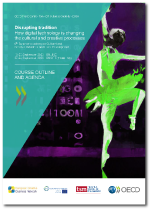 The sixth edition of the Summer Academy took a close look at how advanced technologies, including artificial intelligence (AI), augmented and virtual reality (AR/VR), 3D printing and blockchain, alongside digital platform intermediaries are shaping the cultural and creative sector. It explored the challenges and opportunities presented by these advances and deepened the debate on policy, practitioner and public engagement with these issues.
The sixth edition of the Summer Academy took a close look at how advanced technologies, including artificial intelligence (AI), augmented and virtual reality (AR/VR), 3D printing and blockchain, alongside digital platform intermediaries are shaping the cultural and creative sector. It explored the challenges and opportunities presented by these advances and deepened the debate on policy, practitioner and public engagement with these issues.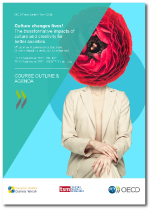 The levels of social, environmental and economic inequality in our society are increasingly challenging the health and wellbeing of people. It is time to rethink our approach to local development, whether in metropolitan areas or smaller towns. Culture and creative activities have the capacity to improve the self-confidence and the creativity of individuals, as well as the quality of places for current and future residents. The fifth edition of the Summer Academy aims to discuss and showcase the role of CCS within a common sustainability framework which includes critical areas such as the environment, demography, and social justice.
The levels of social, environmental and economic inequality in our society are increasingly challenging the health and wellbeing of people. It is time to rethink our approach to local development, whether in metropolitan areas or smaller towns. Culture and creative activities have the capacity to improve the self-confidence and the creativity of individuals, as well as the quality of places for current and future residents. The fifth edition of the Summer Academy aims to discuss and showcase the role of CCS within a common sustainability framework which includes critical areas such as the environment, demography, and social justice.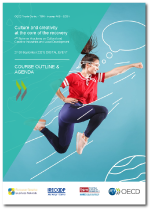 As both the climate emergency and the COVID-19 crisis unfold, with increasingly critical impacts on economic, social and educational inequalities, policy makers, urban practitioners and sustainable development activists all over the world are looking for new ways to lay the foundations for strong, healthy, more equal and resilient communities in the future. They are working on many fronts to address the vulnerabilities this generalised state of crisis is exposing.As cities and regions reconsider growth models in the wake of COVID-19, cultural and creative industries can be put at the core of a resilient recovery. CCS are a significant source of jobs and income, and also generate important spillovers to the wider economy. They are a driver of innovation, a source of creative skills, and act as a magnet that helps drive growth in other sectors such as tourism. Beyond their economic impacts, they also have significant social impacts, from supporting health and well-being, to promoting social inclusion and local social capital.
As both the climate emergency and the COVID-19 crisis unfold, with increasingly critical impacts on economic, social and educational inequalities, policy makers, urban practitioners and sustainable development activists all over the world are looking for new ways to lay the foundations for strong, healthy, more equal and resilient communities in the future. They are working on many fronts to address the vulnerabilities this generalised state of crisis is exposing.As cities and regions reconsider growth models in the wake of COVID-19, cultural and creative industries can be put at the core of a resilient recovery. CCS are a significant source of jobs and income, and also generate important spillovers to the wider economy. They are a driver of innovation, a source of creative skills, and act as a magnet that helps drive growth in other sectors such as tourism. Beyond their economic impacts, they also have significant social impacts, from supporting health and well-being, to promoting social inclusion and local social capital.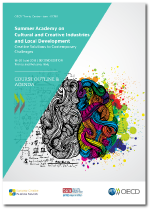 The Academy fosters a hands-on approach, which introduces participants to the overall conceptual and theoretical framework of culture and creativity in local development and invites them to engage proactively, and in creative ways, with local organisations, institutions and places.
The Academy fosters a hands-on approach, which introduces participants to the overall conceptual and theoretical framework of culture and creativity in local development and invites them to engage proactively, and in creative ways, with local organisations, institutions and places.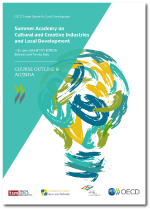 The Academy focused on the relationship between cultural heritage and CCIs, with an exploration of following themes:
The Academy focused on the relationship between cultural heritage and CCIs, with an exploration of following themes: